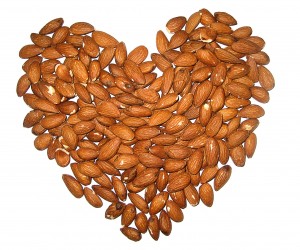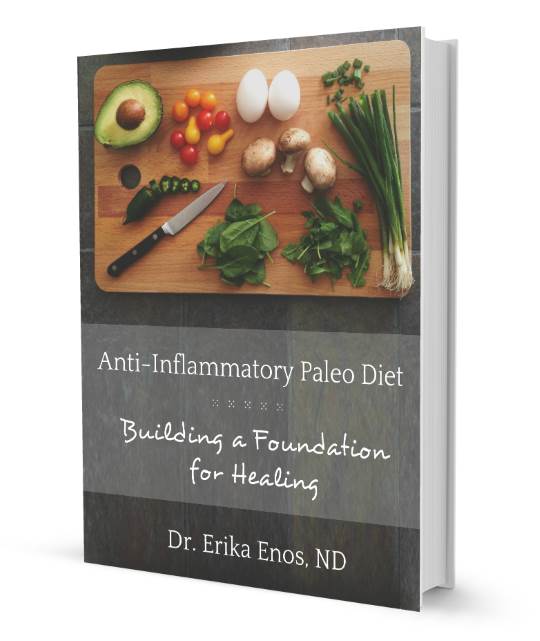 Happy Valentine’s Day!
Happy Valentine’s Day!
This heart-centric holiday has me thinking about the health of both physical hearts and emotional hearts. What can we do to keep both of our hearts healthy?
First, the physical heart. You’ve probably heard about “heart healthy diets.” These diets are often recommended to be low in fat and high in fiber. I agree (whole heartedly!) that fats have a big impact on the health of your heart, but my training and experience has taught me that the types of fats you consume are more important than the amount.
Fats and Your Heart:
Why are fats so important to heart health? When carbohydrates, proteins, and vitamins are absorbed from your intestines into your body, they are absorbed into your blood stream. When dietary fats are absorbed into your body, they first travel through your lymphatic system, not your blood stream. Your lymphatic system carries the cells of your immune system as well as fat molecules and helps cleanse your body. Once absorbed from the intestines into the lymph, fats travel into your upper chest and then merges with the blood stream at the left subclavian artery. This artery is located just below your left collarbone and feeds directly into the aorta of you heart. What does this all mean? It means that unlike other nutrients, fats in your blood stream circulate first to your heart. It is no wonder that fat affects heart health so profoundly!
Every one of our cells has a membrane surrounding it (kind of like a skin); a mix of healthy fats is crucial to this membrane. Cell membranes should be fluid and have both movement and structure; healthy cells should not be too floppy or too stiff. Fats help determine whether the cells will be floppy, stiff or just right. “Just right” for a membrane consists of a mixture of naturally occurring saturated and unsaturated fats. Your heart is an incredibly important organ– wouldn’t you prefer that its cells only encountered fats that help them to build healthy membranes and thrive?
 And that begs the question, which fats will help your heart thrive? Healthy fats can be found in olives, avocados, nuts, seeds, organic butters, CSPO certified sustainable red palm oil, and coconut oil. Whole-milk yogurts (look for brands with live probiotic cultures and no added sugars) and moderate amounts of raw cheese are good choices for those who tolerate dairy. Trans-fats and hydrogenated oils do not contribute to healthy cell membranes nor to healthy hearts because they do not provide the right structure. These fats are not found in nature nor were they present when our cell membranes evolved. Their presence prevents cells from functioning optimally.
And that begs the question, which fats will help your heart thrive? Healthy fats can be found in olives, avocados, nuts, seeds, organic butters, CSPO certified sustainable red palm oil, and coconut oil. Whole-milk yogurts (look for brands with live probiotic cultures and no added sugars) and moderate amounts of raw cheese are good choices for those who tolerate dairy. Trans-fats and hydrogenated oils do not contribute to healthy cell membranes nor to healthy hearts because they do not provide the right structure. These fats are not found in nature nor were they present when our cell membranes evolved. Their presence prevents cells from functioning optimally.
Many popular vegetable oils can also be problematic for heart health because they do not provide the right structure and they go rancid easily—who wants rancid oils making up their heart cell membranes! –or any cell membrane in their body, for that matter! My Holiday blog post includes a more in-depth discussion of cooking oils, which ones to stock in your cupboards, and how oils go rancid. The holiday dessert recipes found there could also be used as Valentine treats for your honey.
Fiber and Your Heart:
I mentioned that not just fat but also dietary fiber as important to heart health. The idea behind the link is that fiber helps absorb excess cholesterol and can be useful in maintaining healthy cholesterol levels. The average American consumes 14–15 grams of fiber daily. The American Dietetic Association recommends 20–35 grams daily. Our hunter-gatherer ancestors are said to have consumed 100+ grams of fiber daily! If this seems like a daunting number, don’t worry… I am not asking you to count fiber grams. Instead, try setting a goal of eating fruits and veggies with every meal, including breakfast. These foods also provide vitamins and minerals to support your heart.
Ideas for Foods that are High in Fiber
When you snack, make it roughage (more fruits and veggies) and seeds rather than processed foods that are low in fiber. If you eat grains, choose whole grains as your staple instead of breads and pastas. Whole grain means that you can see the actual grain kernel because it has not been ground into flour. Good choices are quinoa, millet, amaranth, steel cut oats, whole spelt groats, buckwheat groats, and brown rice. For people who do not have diabetes, arthritis, high blood pressure or who are overweight, enjoying 1-2 cups of these whole grains daily can provide healthy fiber.
Cholesterol is a complex subject and a diet rich in fiber is not the only solution. Cholesterol levels are not just dependent on what you what you eat, they reflect inflammation in the body, liver function, and hormone status as well. An anti-inflammatory diet can go a long way in contributing to healthy cholesterol levels and a healthy heart. If you are concerned about cholesterol levels, I encourage you to make an appointment with me to explore the reasons your levels may not be optimal. If you are curious about the many benefits of an anti-inflammatory diet and would like guidance with it, consider talking with me for free in-person or on the phone for 15 minutes.
Loving and Your Heart:
So far we’ve discussed two eating habits, healthy fats and fiber, which can contribute to a healthy physical heart, but what about your emotional heart? Taking care of your emotional heart is just as important as the physical if you want to achieve holistic well-being for your body, mind, and spirit. Daily care for you heart can be as simple as conscious deep breathing to relieve stress and by making a point to do something you love everyday, even if it is very simple. For example, taking a walk in the sunshine, taking a break to savor a cup of tea and a small piece of dark chocolate, or doing something creative like playing the piano or sketching. You are the expert on the activities that feed your heart, make sure that you are making time for them on a regular basis.
 Love is another way to strengthen your heart. (How could I write a Valentine’s Day post without mentioning love???) And this is not just receiving love; our hearts become stronger when we give love as well. Giving love can simply mean showing those we love that we care for and are thinking about them. Increase your love and your heart health by making time to spend with nearby friends, by calling old friends, and by remembering to hug your friends and family. A Montessori schoolteacher I know once told me we need 13 hugs a day. That number might seem as daunting as 100 grams of fiber—but 3 hugs daily sounds like a reasonable number, doesn’t it?
Love is another way to strengthen your heart. (How could I write a Valentine’s Day post without mentioning love???) And this is not just receiving love; our hearts become stronger when we give love as well. Giving love can simply mean showing those we love that we care for and are thinking about them. Increase your love and your heart health by making time to spend with nearby friends, by calling old friends, and by remembering to hug your friends and family. A Montessori schoolteacher I know once told me we need 13 hugs a day. That number might seem as daunting as 100 grams of fiber—but 3 hugs daily sounds like a reasonable number, doesn’t it?
Naturopathic Prescription for Your Heart:
So, here is your Valentine’s Day prescription: feed yourself a healthy meal with lots of veggies and healthy fats of your choice, nibble a square of dark chocolate while walking in the sunshine, call someone you care about just to let them know that they’re special, and don’t forget to hug someone.
